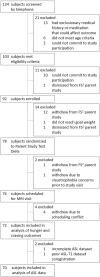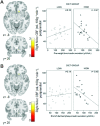Diets Varying in Carbohydrate Content Differentially Alter Brain Activity in Homeostatic and Reward Regions in Adults
- PMID: 33852013
- PMCID: PMC8349124
- DOI: 10.1093/jn/nxab090
Diets Varying in Carbohydrate Content Differentially Alter Brain Activity in Homeostatic and Reward Regions in Adults
Abstract
Background: Obesity has one of the highest refractory rates of all chronic diseases, in part because weight loss induced by calorie restriction, the first-line treatment for obesity, elicits biological adaptations that promote weight regain. Although acute feeding trials suggest a role for macronutrient composition in modifying brain activity related to hunger and satiety, relevance of these findings to weight-loss maintenance has not been studied.
Objectives: We investigated effects of weight-loss maintenance diets varying in macronutrient content on regional cerebral blood flow (rCBF) in brain regions involved in hunger and reward.
Methods: In conjunction with a randomized controlled feeding trial, we investigated the effects of weight-loss maintenance diets varying in carbohydrate content [high, 60% of total energy: n = 20; 6 men/14 women; mean age: 32.5 y; mean BMI (in kg/m 2): 27.4; moderate, 40% of total energy: n = 22; 10 men/12 women; mean age: 32.5 y; mean BMI: 29.0; low, 20% of total energy: n = 28; 12 men/16 women; mean age: 33.2 y; mean BMI: 27.7] on rCBF in brain regions involved in hunger and reward preprandial and 4 h postprandial after 14-20 wk on the diets. The primary outcome was rCBF in the nucleus accumbens (NAcc) at 4 h postprandial; the secondary outcome was preprandial rCBF in the hypothalamus.
Results: Consistent with a priori hypothesis, at 4 h postprandial, NAcc rCBF was 43% higher in adults assigned to the high- compared with low-carbohydrate diet {P[family-wise error (FWE)-corrected] < 0.05}. Preprandial hypothalamus rCBF was 41% higher on high-carbohydrate diet [P(FWE-corrected) < 0.001]. Exploratory analyses revealed that elevated rCBF on high-carbohydrate diet was not specific to prandial state: preprandial NAcc rCBF [P(FWE-corrected) < 0.001] and 4 h postprandial rCBF in hypothalamus [P(FWE-corrected) < 0.001]. Insulin secretion predicted differential postprandial activation of the NAcc by diet.
Conclusions: We report significant differences in rCBF in adults assigned to diets varying in carbohydrate content for several months, which appear to be partially associated with insulin secretion. These findings suggest that chronic intake of a high-carbohydrate diet may affect brain reward and homeostatic activity in ways that could impede weight-loss maintenance. This trial was registered at clinicaltrials.gov as NCT02300857.
Keywords: brain activity; dietary carbohydrate; obesity; reward; weight loss maintenance.
© The Author(s) 2021. Published by Oxford University Press on behalf of the American Society for Nutrition.
Figures






Comment in
-
Food for Thought.J Nutr. 2021 Aug 7;151(8):2089-2091. doi: 10.1093/jn/nxab210. J Nutr. 2021. PMID: 34195820 No abstract available.
References
Publication types
MeSH terms
Substances
Associated data
Grants and funding
LinkOut - more resources
Full Text Sources
Other Literature Sources
Medical

